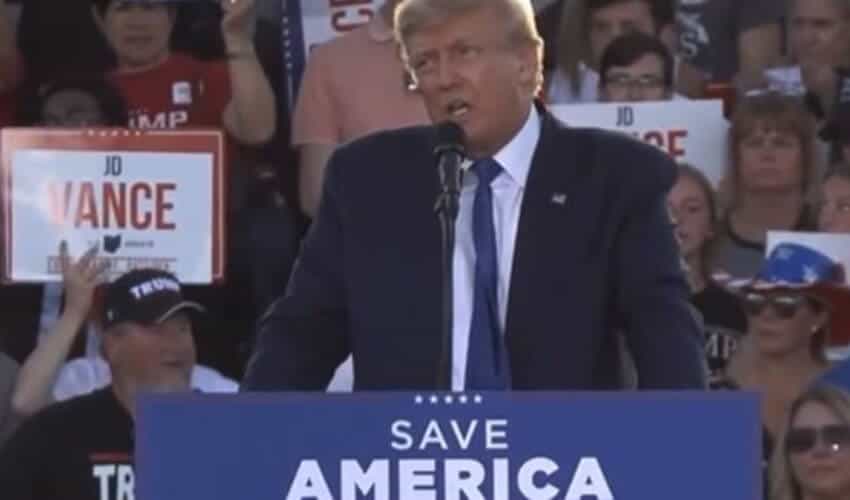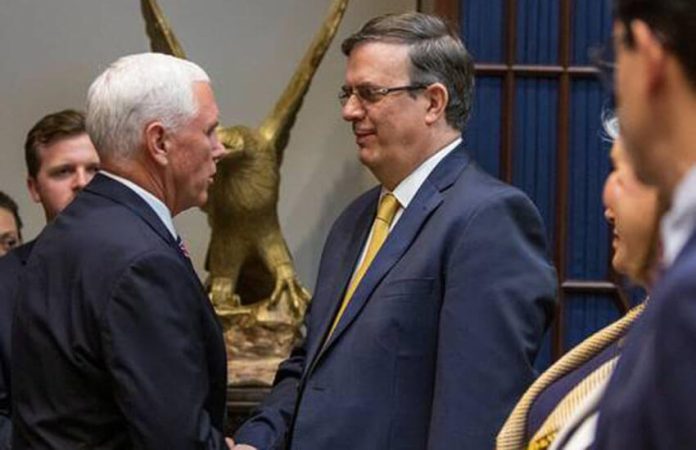Former United States president Donald Trump said Saturday that Mexico “folded” and agreed to place troops on its northern border to stem illegal immigration to the U.S. when he threatened in 2019 to impose blanket tariffs on Mexican imports.
Speaking at a rally in Ohio for U.S. Senate hopeful J.D. Vance, Trump recounted a June 2019 meeting with a Mexican delegation led by Foreign Affairs Minister Marcelo Ebrard.
“So in comes the highest representative of Mexico, right under the top, right under the boss who happens to be president … and he laughs at me when I tell him, ‘We need 28,000 soldiers along the border free.’ He looks at me like, ‘Free? Why would we do that?’” the former president said.
Referring to the Migrant Protection Protocols (MPP), which force migrants to wait here while their asylum claims in the U.S. are resolved, Trump said he also told Ebrard, “We need something called ‘Stay in Mexico.’”
“And he said, ‘We wouldn’t do that,’” the 45th U.S. president told the rally.

Trump claimed he then told Ebrard at a Friday meeting that a 25% tariff would be imposed the following Monday morning on all Mexican imports to the United States, including vehicles, if Mexico didn’t agree to what he wanted.
“And he looked at me and said, ‘Sir, it would be an honor to have 28,000 soldiers on the border, it would be an honor to have Stay in fricking Mexico,” Trump said.
“… I’ve never seen anybody fold like that; they said it would be an honor to have 28,000 free soldiers, and for two years we did, and that’s one of the reasons we had the best numbers in the history of the border. Thank you very much, Mexico,” he said, referring to a reduction in illegal border crossings.
The core of Trump’s story may be true, but there is little doubt his recollections are embellished.
On June 24, 2019 — more than two weeks after Mexico and the United States reached an agreement to stave off what was reported at the time as a threat of a 5% tariff on Mexican goods — the Mexican government said that almost 15,000 federal security force members had been deployed to the northern border to stop migrants crossing illegally into the United States, while an additional 10,500 were deployed to Mexico’s southern border.
The MPP, commonly known as the “Remain in Mexico” policy, began in January 2019 — months before Trump’s meeting with Ebrard — although the program ramped up after they met. All told, more than 71,000 asylum seekers were returned to Mexico between January 2019 and January 2021, the month Trump left office.
During his rally address, the former U.S. president also referred to President López Obrador as a socialist.
“[He’s] a really nice guy; I really like him. He’s a socialist, but I like him. He’s one of the socialists I like,” Trump said.
The two men met at the White House in July 2020, at which time López Obrador said that Trump had never tried to “impose” anything on Mexico that violates the country’s sovereignty and hadn’t tried to “treat us as a colony.”
For his part, Trump declared he had an “outstanding” relationship with López Obrador and said that the United States had been “helped greatly by Mexico in creating record numbers in a positive sense on our southern border.”
With reports from Reforma and El Universal
